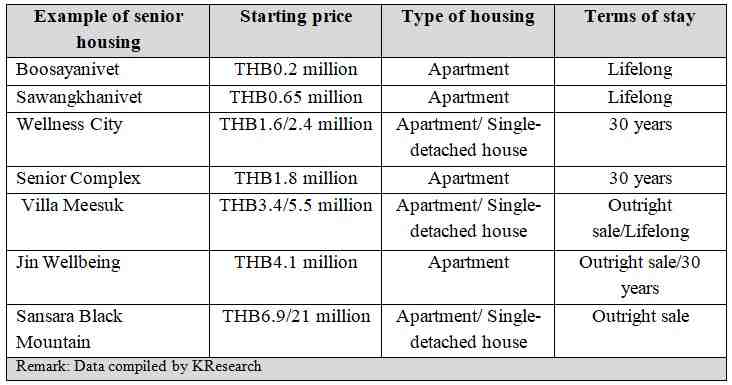Thailand will
become a
fully aged society
[1] in 2024, becoming a super-aged society
[2]within the next 12 years or in 2032.
There will be a marketplace of products and services designed to make life
easy and safe, specifically for those of the aging population with purchasing power or savings.
The lifestyles of
the elderly have tended to
become more solitary, as reflected
in the Elder Population Survey in 2017 [3]. The outcome shows that the proportion of elderly people living alone
is approximately 10% of the elderly population,
with a CAGR
of more than 4.5%
overthe period of 2007-2017 and with
a continuing upward trend projected for the future. This will lead to a rise in the
basic needs of elderly people, such as housing, in line with the increase in proportion of Thailand’s elderly population.
The supply of housing
for the elderly is currently still focusing on the upper class
of the market and the luxury segment,
as well as premium services, mainly
targeting those of the elderly
population with high purchasing power.
It is stipulated that the
purchasers of such housing must be aged 50-55 years and
make all payments and advances in one lump sum amount, excluding
monthly common expenses and other expenses. However,
this may still fall short of meeting the needs of the group of elderly people who have
lesser purchasing power but have adequate savings plans,
who have been left with few options. Therefore, there
appears to be an opportunity for entrepreneurs to market
to this target group with appropriate
components, including price factors,
necessary residential and medical
features,
and the ability to build
the confidence of the elderly
to live in such residences.

In consideration of the purchasing power of elderly people, KResearch views that the potential target group is still the elderly with sufficient savings or who have planned ahead for their post-retirement finances, but there is still a need for appropriate support conditions to meet the needs of this elderly group, focusing on securing the care and medical services this demographic needs throughout their stay, which are more important than ownership of housing.
KResearch believes that these important support conditions will help the senior housing market to better meet the needs of high potential elderly people, but they may need to include 2 key factors as follows:
1) Building confidence in the ability to respond to the changing needs of the elderly at different times, especially in the area of health or continuing care. The packages of services offered must be able to change flexibly pursuant to the terms of the contract, with reliable resources or business partners to ensure continued care for the elderly. When there is a change in health of the elderly, for instance if an elderly person moves from a situation where he/she is able to take care of himself/herself to being a patient in need of medical care, he/she will be able to modify the service received under the terms of the contract agreed. The elderly can choose additional services tailored to their needs, either in installments or in the form of health insurance premiums, to pay for the necessary medical services depending on their health conditions at different times instead of a universal package that requires a large pre-paid sum. Continuing care accommodation is very popular in locations such as the US and Europe, because it builds confidence and assures the elderly of the stability of their standard of living.
2) Adjustment of marketing strategies and financial products to increase the affordability of access to housing for the elderly, emphasizing an easier purchase price, i.e. the unit amount shall not exceed THB2.5 million. It shall also expand the target group of elderly people eligible to purchase housing to include elderly caregivers and wage earners who have planned ahead for retirement from the age of 45. Alternatively, these wage earners could be offered the right to re-purchase a dwelling in the form of long-term installments, and then move in upon reaching a specified age, which would help reduce the risk of making a large lump sum payment. Meanwhile, financial products shall be introduced to support financial planning for post-retirement housing, such as Singapore’s compulsory contribution to the Central Provident Fund for housing, medical services and living expenses after retirement.
In summary, KResearch views that the above two approaches shall help the elderly housing business to meet the needs of the target group more effectively
than
at present. However, the industry may still
need to be supported by other factors, such as private
operators working with government agencies and
public hospitals to
have certified and reliable standards for senior housing,
allowing
the development of projects on state-owned land to house the elderly,
co-investing with the government in
project development and
zoning
to create government housing for the elderly, or supporting
the participation of specialized start-up companies
in
the
development of projects. If the
aforesaid market
can be expanded
to cover more elderly people,
it will also
have a positive effect on the social welfare management
for the elderly
in Thailand in the long run.
[1] A fully aged society means a society in which over 14% of the population is more than 65 years of age.
[2] A super-aged society means a society in which over 20% of the population is more than 65 years of age.
[3] National Statistical Office of Thailand
Scan QR Code

Annotation
This research paper is published for general public. It is made up of various sources. Trustworthy, but the company can not authenticate. reliability The information may be changed at any time without prior notice. Data users need to be careful about the use of information. The Company will not be liable to any user or person for any damages arising from such use. The information in this report does not constitute an offer. Or advice on business decisions Anyhow.